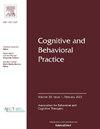Augmenting Virtual Mindfulness Group With a Mindfulness App in Integrated Primary Care: Development, Feasibility, and Acceptability
IF 2.9
3区 心理学
Q1 PSYCHOLOGY, CLINICAL
引用次数: 0
Abstract
As the body of support for the usefulness of mindfulness-based practices within therapeutic intervention has grown, so has demand. To increase access to this evidence-based care, skill-building groups as well as mobile apps that deliver mindfulness training have been developed. However, evaluations of app-augmented group mindfulness interventions are lacking. This pilot study developed and implemented a protocol augmenting a virtual Veterans Affairs–Compassionate Awareness Learning Module (VA-CALM) group with the Mindfulness Coach app in a Mid-Atlantic VA health system. The 6-week app-augmented group was implemented across four cycles (n = 18) within the system’s Integrated Primary Care setting. Qualitative feedback was collected and used to improve the integrative protocol iteratively across group cycles. Feedback indicated participants found the app supported skill growth and that the group context enhanced app engagement, while others found it difficult to navigate the app and build new habits. Quantitative outcomes indicated improvements in stress, health-related quality of life, and the mindfulness skill of nonreactivity. App usage among group members ranged from none to frequent. Groups in combination with apps may be a feasible and acceptable way to support mindfulness skill growth and application to daily life for some veterans. Further study should focus on patient-level factors that are relevant to engagement and efficacy of app-augmented protocols, as well as whether engagement predicts clinical improvement.
在综合初级保健中使用正念应用程序增强虚拟正念小组:开发、可行性和可接受性
随着对治疗干预中基于正念的实践有用性的支持越来越多,需求也越来越多。为了增加获得这种循证护理的机会,已经开发了技能培养小组以及提供正念训练的移动应用程序。然而,对应用程序增强的群体正念干预的评估是缺乏的。这项试点研究开发并实施了一项协议,通过正念教练应用程序在大西洋中部退伍军人医疗系统中增强虚拟退伍军人事务-同情意识学习模块(VA- calm)小组。6周的应用程序增强组在系统的综合初级保健设置中实施了四个周期(n = 18)。收集定性反馈并用于跨组循环迭代地改进综合方案。反馈显示,参与者发现这款应用有助于技能提升,小组环境增强了应用的参与度,而其他人则发现很难驾驭这款应用并养成新的习惯。定量结果表明压力、健康相关生活质量和无反应的正念技能有所改善。小组成员使用App的频率从零到频繁不等。对于一些退伍军人来说,团体与应用程序的结合可能是一种可行且可接受的方式,可以支持正念技能的发展,并将其应用于日常生活。进一步的研究应该关注与应用程序增强方案的参与和有效性相关的患者层面因素,以及参与是否能预测临床改善。
本文章由计算机程序翻译,如有差异,请以英文原文为准。
求助全文
约1分钟内获得全文
求助全文
来源期刊

Cognitive and Behavioral Practice
PSYCHOLOGY, CLINICAL-
CiteScore
4.80
自引率
3.40%
发文量
118
审稿时长
84 days
期刊介绍:
Cognitive and Behavioral Practice is a quarterly international journal that serves an enduring resource for empirically informed methods of clinical practice. Its mission is to bridge the gap between published research and the actual clinical practice of cognitive behavior therapy. Cognitive and Behavioral Practice publishes clinically rich accounts of innovative assessment and diagnostic and therapeutic procedures that are clearly grounded in empirical research. A focus on application and implementation of procedures is maintained.
 求助内容:
求助内容: 应助结果提醒方式:
应助结果提醒方式:


